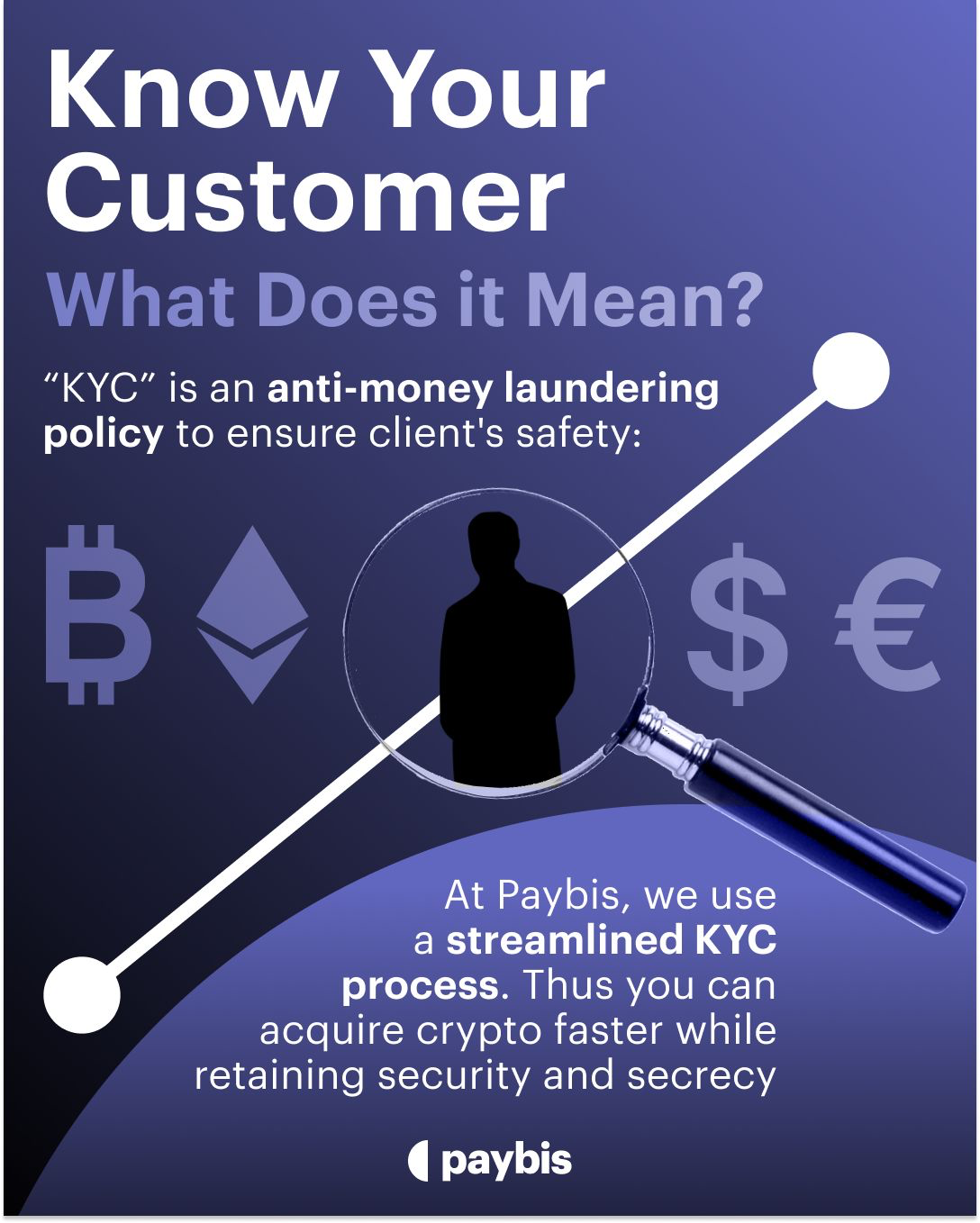KYC
KYC (Know Your Customer) refers to the verification process that customers go through to: Verify their identity and link it to a cryptocurrency wallet, Get a better understanding of the potential customer’s activities and determine whether or not these are of legal nature, Evaluate the possibility of money laundering risks associated with a particular customer.
As the crypto industry evolves, so do the regulatory requirements to ensure security and compliance.
To address concerns related to illicit activities, governments and regulatory bodies have introduced Anti-Money Laundering (AML) and Know Your Customer (KYC) regulations for crypto service providers.
KYC (Know Your Customer) involves procedures to verify customer identities, assess risks, and prevent financial crimes like money laundering and fraud.
KYC compliance maintains regulatory standards, ensures transaction integrity, and includes customer identification programs, due diligence, and ongoing monitoring.
Financial institutions conduct identity and document verification, as well as risk assessment, to protect against illicit activities and comply with regulations.
In this article, we will look at what does KYC mean in crypto and how it acts as a preventive measure in the global economy, safeguarding businesses and customers from financial crimes.
Table of contents
KYC Meaning in Crypto – What is it?

KYC (Know Your Customer) refers to the verification process that customers go through to:
- Verify their identity and link it to a cryptocurrency wallet
- Get a better understanding of the potential customer’s activities and determine whether or not these are of legal nature.
- Evaluate the possibility of money laundering risks associated with a particular customer.
Now that you understand what is KYC in crypto, let’s look at why it is important.
Importance of KYC for Crypto Exchanges
Preventing Illicit Activities
Cryptocurrencies, like Bitcoin, were initially designed for decentralized transactions, but they have been used for illicit activities, reaching a record $20.1 billion in 2022. This includes child sexual abuse materials, human trafficking, ransomware, stolen funds, terrorism financing, scams, cyber-criminal administrators, and dark net markets.
To combat these issues, KYC crypto processes are crucial. KYC helps prevent suspicious transactions by verifying the identities of cryptocurrency users when they purchase Ethereum or other cryptocurrencies.
By implementing robust KYC procedures, crypto platforms ensure proper identification and risk assessment of users. KYC requires some personal identification information, government-issued identification, proof of address, and sometimes facial recognition. These measures make it harder for criminals to operate anonymously.
Incorporating KYC protocols creates a secure and transparent environment, deterring illicit actors and enhancing the integrity of the cryptocurrency ecosystem. Such measures are vital to protect against cryptocurrency misuse and promote a safer digital financial landscape.
Investor Protection
In 2022, hackers stole nearly $4 billion worth of cryptocurrency, with DeFi protocols as a major target. Unlike centralized exchanges that implement KYC procedures, DeFi protocols often lack stringent KYC requirements. KYC processes play a crucial role in verifying the identities of individuals in cryptocurrency transactions, reducing fraud and identity theft risks.
Centralized exchanges, following KYC requirements, establish trust by verifying user identities and adhering to investor protection codes. Implementing KYC protocols creates a more secure environment, making it harder for hackers and fraudsters to exploit vulnerabilities.
On the other hand, DeFi protocols operate in a decentralized, permissionless, and trustless manner, generally lacking KYC processes. This absence of KYC undermines investor protection and makes it challenging to identify and mitigate fraudulent risks.
Compliance with Regulations
Governments and financial institutions often require crypto businesses to comply with KYC regulations to ensure transparency, traceability, and accountability in financial transactions.
By implementing robust KYC procedures, crypto platforms can demonstrate their commitment to regulatory compliance and avoid potential legal consequences, penalties, and reputational damage.
Building Trust and Reputation
The crypto industry is evolving to attract a broader audience and investors. As the industry matures, the implementation of robust KYC measures becomes increasingly crucial.
By doing so, crypto platforms mitigate the risks associated with financial crimes and showcase their commitment to transparency and regulatory compliance. To improve consumers’ faith in crypto as an asset, a survey shows it should be more regulated.
This fosters a more secure and regulated environment within the industry, instilling confidence among participants.
Furthermore, the adoption of reliable KYC practices enhances the reputation of crypto platforms, making them more appealing to both individual users and investors. As the industry gains a reputation for trustworthiness and compliance, it becomes more attractive for investors to actively engage in crypto investments, contributing to the growth and development of the industry.
How Does KYC Work?
Many centralized cryptocurrency exchanges are required to comply with rules and regulations, which necessitate users to provide various documents such as a driver’s license, passport, or other government-issued identification.
Some exchanges may even ask for a short video or photo of the user holding these documents. Additionally, users are often required to share their proof of residency, full name, and date of birth.
The verification process involves manual verification of the submitted documents, which can delay the ability to buy cryptocurrencies. If any discrepancies or issues arise, users may need to go through the verification procedure again.
In case of completing KYC on Paybis, you do not have to wait more than just a few minutes! Our team is on stand by 24×7 to go through your documents and approve your KYC request.
Once the verification is successfully completed, users can add funds to their accounts and trade freely. They also have the flexibility to withdraw funds at any time.
What Are the Benefits of Crypto KYC?
The benefits of KYC are numerous and can have a positive impact on both financial service providers and their customers.
Enhanced Trust
In response to the FTX bankruptcy and the volatile nature of the crypto market, regulatory bodies such as the U.S. Securities and Exchange Commission (SEC) and the Commodity Futures Trading Commission (CFTC) have been actively scrutinizing crypto exchanges.
The heightened regulatory environment has underscored the importance of implementing robust KYC procedures in the financial industry. By conducting thorough customer verification and due diligence, financial service providers can showcase their dedication to combating fraudulent activities, money laundering, and other illicit behaviors.
When customers know that their chosen institution adheres to stringent KYC protocols, they gain assurance that reliable and trustworthy entities are handling their funds and personal information.
Through comprehensive customer verification, financial service providers can establish the authenticity of customer identities, assess potential risks, and prevent unauthorized access to financial systems.
Customer Experience
Peer-to-peer transfers of digital currencies have transformed cross-border transactions, providing fast and intermediary-free options.
However, this convenience has also attracted hackers who exploit vulnerabilities to steal funds. KYC practices offer investors a vital opportunity to safeguard their assets from fraudsters.
Implementing KYC enhances fund security by verifying identities and conducting due diligence. This helps investors validate counterparties and identify potential risks before engaging in transactions.
KYC instills confidence by demonstrating a commitment to a trustworthy and transparent environment for digital currency exchanges. It encourages broader adoption of peer-to-peer transfers by reducing concerns about fraud.
No scams and fewer hacks
Crypto exchanges face persistent vulnerabilities, including the risk of hacks, data breaches, and other malicious attacks. To mitigate these threats, exchanges often resort to freezing accounts temporarily when suspicious or illicit activities are detected.
While a double-edged sword, the implementation of KYC protocols empowers exchanges to promptly respond to potential criminal activities by freezing or closing accounts associated with such behavior.
KYC measures enable exchanges to take swift action when identifying accounts linked to illicit transactions. By verifying the identities of users and conducting due diligence, exchanges can proactively detect and prevent criminal activity.
This ensures a safer trading environment and enhances the overall security of the crypto ecosystem.
What Challenges Do Crypto Exchanges Face with KYC?
One of the significant challenges in implementing KYC procedures in the crypto trading industry is the lack of standardization across jurisdictions.
As each country develops its regulatory framework for cryptocurrencies, there is a lack of a universal definition and a firmly acknowledged path for compliance, making it difficult for exchanges to navigate the regulatory landscape effectively.
Different countries have varying approaches to KYC and AML compliance in the crypto space.
For example, the United States has a patchwork of regulations involving multiple agencies like the SEC and the CFTC. At the same time, the EU has introduced specific directives (AMLD5 and AMLD6) to regulate cryptocurrencies and ensure KYC and AML compliance. India has experienced a mixed stance, with previous restrictions lifted but ongoing considerations for a regulatory framework.
This lack of uniformity poses challenges for crypto exchanges as they need to navigate and comply with varying KYC verification standards, which can be inconsistent and unclear across different jurisdictions.
Exchanges may face difficulties in determining the appropriate level of customer due diligence required, as well as the specific documentation and processes needed to meet compliance obligations.
Further, the absence of a universally recognized framework for KYC in crypto creates complexities for users and businesses in selecting reliable and compliant exchanges. With numerous companies operating in the market, it becomes crucial for individuals to choose platforms with robust KYC procedures that demonstrate their commitment to compliance and security.
To address this challenge, industry collaboration and international regulatory coordination are essential. Establishing common standards and guidelines for KYC processes in the crypto industry would promote consistency, clarity, and trust among exchanges, regulators, and users globally.
Increased efforts to harmonize regulatory approaches and enhance cross-border cooperation would help create a more cohesive and effective framework for KYC in the crypto space.
The Future of KYC in the Crypto Industry
Increased Uniformity of KYC Requirements
Regulators are actively working to enhance KYC measures in the crypto industry, and one example of such efforts is the European Union’s Markets in Crypto Assets (MiCA) regulation.
MiCA aims to establish a comprehensive regulatory framework for crypto assets, including KYC and AML obligations. As part of the regulation, businesses intending to offer cryptocurrency assets or stablecoins are required to create a white paper that outlines various aspects of their operations, rights and duties, capital, risks, marketing strategies, and other relevant information.
Additionally, Crypto Asset Services Providers (CASPs) must obtain licensing permission from the relevant national responsible authorities and comply with governance standards and minimum capital requirements, including having a physical location within the EU.
Enhanced Customer Due Diligence
CDD (Customer Due Diligence) is an important part of adhering to KYC regulations. Financial organizations may eventually undertake CDD using advanced procedures. This comes in handy when the customer is identified as a Politically Exposed Person (PEP) or a known close associate of a PEP.
Read this interview with MLRO of Paybis for more insight into compliance and CDD.
Artificial Intelligence (AI) and Machine Learning (ML) in KYC Compliance
AI and ML in the KYC (Know Your Customer) process is the use of AI to detect AI-forged identity documents. By leveraging AI technology, it becomes possible to efficiently combat AI fraud. AI algorithms can be trained to identify patterns and discrepancies in identity documents, helping to authenticate and verify the legitimacy of customer information. This can enhance the accuracy and effectiveness of KYC procedures.
Conclusion
Sometimes, KYC can feel like a hassle. But it is a critical leap forward for regulatory compliance.
While it may seem inconvenient to provide personal information and go through the KYC process, it helps prevent fraudulent activities, money laundering, and other illegal activities associated with cryptocurrencies. KYC helps create a safer environment for users and enhances the overall integrity of the crypto ecosystem.
The reason why we do KYC at Paybis is simple — to protect you against unwelcome incidents. KYC procedures help us identify potential threats and illegal activites and help make buying and selling crypto much safer for everyone.
FAQ
Can I buy crypto without KYC?
Yes, it is possible to buy cryptocurrencies without undergoing KYC (Know Your Customer) verification, but it depends on the platform you choose. Some digital asset exchanges and peer-to-peer platforms allow users to buy, sell, and trade cryptocurrencies without requiring them to provide personal identification information. These exchanges often offer options for anonymous or non-KYC trading, but it’s important to exercise caution and consider the risks associated with such platforms.
Do crypto wallets need KYC compliance?
Crypto wallets themselves do not require KYC compliance. Wallets are software applications or hardware devices that enable users to securely store and manage their cryptocurrency holdings. KYC compliance is typically associated with exchanges or platforms that facilitate the buying, selling, or trading of cryptocurrencies. However, certain wallet services may incorporate KYC requirements if they offer additional features like fiat on-ramps or integrated exchange functionalities. It’s important to check the specific requirements of the wallet provider or the platforms integrated with the wallet to determine if KYC compliance is necessary.
Are there any crypto exchanges without KYC?
Yes, there are crypto exchanges that do not require KYC (Know Your Customer) verification. You can buy cryptocurrencies from Paybis upto a certain limit without having to worry about kYC verification.
Disclaimer: Don’t invest unless you’re prepared to lose all the money you invest. This is a high‑risk investment and you should not expect to be protected if something goes wrong. Take 2 mins to learn more at: https://go.payb.is/FCA-Info


